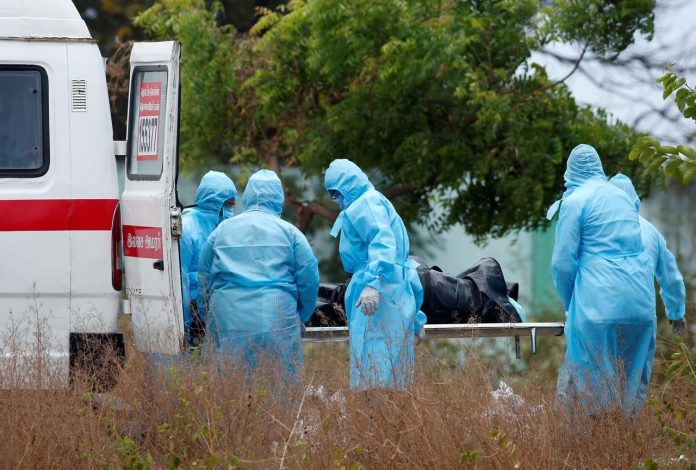This article is Written by Arun Shekhar Jawla, a student, pursuing BA LLB from Chandigarh University.
Table of Contents
Introduction
“Death must be so beautiful. To lie in the soft brown earth, with the grasses waving above one’s head, and listen to silence. To have no yesterday and no tomorrow. To forget time, to forget life, to be at peace.” – Oscar Wilde
India is a Secular country. It is common in every religion that dead people are treated with respect and full dignity with all its complexity. In Hindu Religion, Asthi Visarjan is one of the most critical rituals and obligatory religious ceremony. It involves collecting leftover bones and some ashes after performing the Antim Sanskar [The Last Rites] and immersing the remains of the dead in the holy river- Ganga. This last Ritual is prescribed in all Hindu’s sacred text. It marks the journey of the soul from one life to the other.
Owing to COVID-19 pandemic, the entire world has gone into paranoia. Dead Bodies are being dumped and disposed of as garbage. Even the kin of the COVID-19 patients runs away from such patients’ bodies after death due to the fear of getting infected. Uncountable dead bodies are being dumped in River Ganga rather than the ashes. The world is falling into madness.
The situation has become so dire that NHRC has taken cognizance of the complaint regarding the dead bodies floating in Ganga in several areas of UP and Bihar. NHRC is taking steps to protect the fundamental rights of the corpses as in a decent burial.
Article 21 and its Extend
Article 21- Right to Protection of Life and Personal Liberty
This article has the most comprehensive scope in the whole Constitution. Courts has frequently provided with interpretation of the same.
Right to life also includes the Right to Privacy, The Right of Dignity and fair treatment, The Right to Decent Burial, etc.
I believe that Article 21 is more like a Life Insurance Policy at LIC. It provides you many rights throughout your life, and Even after Life, you have rights. As in the Motto of LIC, “Zindagi Ke Saath Zindagi ke baad” [In Life and beyond Death].
In simple terms, Article 21 provides right to an individual not just during life but also after death.
Different High Courts have revised and extended the scope of Article 21 of the Indian Constitution. And by including The Right of Cremation with Proper Respect and Dignity under The Right To Life has recognized the need to give proper care and dignity to the dead human even after death.
Firstly, in the case of Kharak Singh vs State of Uttar Pradesh [1962], the scope of Right to Life expanded to include Right to Life with Human Dignity and not merely ‘Animal Existence’.
Later, in the case of Common Cause (registered society) v Union of India, it was contended that the Right to live with human dignity extends even beyond death. The same dignity should be extended to the person who is dead by providing a proper death procedure.
The Right to decent Burial is a fundamental right, and Burial should be done ‘as per the religious rules’ [As the Religion Demands]. It was reiterated by the Supreme Court of India in Ashray Adhikar Abhiyan v. Union of India. The dignity of the dead people ought to be preserved and honoured as per the appropriate religious customs and regulations.
In Vikash Chandra Guddu Baba v. The UOI & Ors, Court ruled that it is the responsibility of the state and hospital staff to dispose of the unclaimed or any Jane Doe with full compliance with the law of the land. If the deceased’s religion can be identified, then the last rites must be performed with the conformity of the religious practice of the dead.
Furthermore, Supreme Court upheld that the word ‘Person’ is not limited in the strictest sense of an alive person. Here, ‘Person’ can also include a dead person in some exceptional cases. [Parmanand Katara v. Union of India]
In layman’s terms, Article 21 – Right to Life includes the Right to live with human dignity and such dignity and respect extended to the dead body. Government needs to respect a deceased person by allowing the body of such a dead person to be treated with the same respect and dignity as given to any alive person.
It is crystal clear that the government is obligated to protect and defend the rights of a dead person too. And provide everyone with a decent burial with human dignity according to their religious customs.
Recent Developments
Ever since this COVID-19 pandemic took place, there has been seen a rise in the number of cases where the Right to Burial has been grossly violated. Authorities have mismanaged and disposed of dead bodies. Even people are avoiding claiming bodies or even performing the last rites. The guidelines issued by WHO and the Government of India for safe disposal of bodies infected with COVID-19 have been unwitting ignored or not being followed to its fullest. It needs to be noted that there was no scientific study to show that novel coronavirus spreads through cadavers or dead bodies; hence Corporation and other concerned authorities have been given power to designate burial grounds and cemeteries.
Pradeep Gandhy v. the State of Maharashtra
A petition was filed in Bombay HC challenging a circular issued by the BMC to designate burial grounds for disposing of COVID-19 patient bodies. However, HC dismissed the petition.The Bench said, “Right to a decent burial, commensurate with the dignity of the individual, is recognized as a facet of the Right to life guaranteed by Article 21 of the Constitution. There is no reason as to why an individual who dies during this period of crisis because of suspected/confirmed COVID-19 infection would not be entitled to the facilities he/she would have otherwise been entitled to but for the crisis.”
Similarly, while observing the Fundamental Right to life guaranteed under Constitution includes the Right to Decent Burial or Cremation, in High Court on its own motion Vs State of Maharashtra, Madras High Court warned the locals against objecting regarding the disposal of the bodies of a victim of COVID-19.
Vineet Ruia Vs the Principal Secretary, MOHFW, Govt. Of West Bengal
Here, Calcutta High Court has ruled that Article 21 of the Constitution is available to a living person and dead bodies. The court further held that doing so concerning tradition and culture is also an FR that can be traced under Article 25.
Furthermore, the Telangana High Court in the case of R. Sameer Ahmed v. State of Telangana & Ors remarked that:
“Even in death, human bodies are not being treated with the dignity they deserve” and directed the state government to let the court know if the dead bodies are being cremated/buried in a dignified manner or not.”
Role of IPC and Other Acts
Section 297– Rights of a deceased person include protection against trespass on burial sites, place of funeral sites, etc. Crime is:
Punishment – Imprisonment of either description.
Term – It may extend to one year, or with fine, or with both.
Section 404– It deals with the punishment for fraudulent misappropriation of a deceased person’s property at the time of his/her death or after death.
Punishment – Imprisonment of either description.
Term – It may extend to three years and shall also be liable to a fine.
Section 499- It deals with Defamation. Whoever, by words- spoken or written, or by sign or by visual representation, publish or makes any imputation to a deceased person. It is known that it will harm the reputation of the deceased as if the imputation would harm a living person’s reputation and intends to harm the feelings of his/her family or any close relatives.
Punishment – Simple Imprisonment or with fine, or with both.
Term – It may extend to two years.
Section 503- It deals with Criminal intimidation. Whoever threatens another to injure the reputation or property of any deceased person in whom the person is interested and to cause alarm or create fear to such person. It all falls in the arena of Criminal Intimidation.
Punishment – Imprisonment of either description or with fine, or with both.
Term – It may extend to two years.
The Transplantation of Human Organs and Tissues Act of 1994 [THOTA]
It guarantees the recently departed the Right to protect and preserve his/her internal organs or tissues or both from being harvested without the prior consent of the deceased or permission of close relatives.
The protection provided under International Covenants
The following provisions of different international conventions and laws deal with the protection and preservation of the rights and dignity of the deceased person. They are:
The Fourth Geneva Convention 1949 [GCIV]: Article 16 para 2 provides “As far as military consideration allows, each party to the conflict shall facilitate the steps taken to protect the killed against ill-treatments.”
Article 130(1) provides the guidelines that the state need to ensure. The state has the responsibility that graves are to be respected, properly maintained, and marked in such a way that they can always be recognized’.
-
- Cairo Declaration of Human Rights in Islam, 1990: Article 3 (a) provides that “In the event of the use of force and in case of armed conflict- it is prohibited to mutilate dead bodies”.
- UN Commission on Human Rights in 2005 adopted a resolution that highlighted the importance of handling human remains in a dignified manner and with the proper management and respect.
- The UN’s Inter-Agency Standing Committee’s Operational Guidelines on Human Rights and Natural Disasters recommend that appropriate measures needs to be taken ‘to facilitate the return of remains to the next of kin. In addition, measures should allow for the possibility of recovery of human remains for future identification and reburial if required’.
Legal status
The guidelines issued by the WHO, National Disaster Management Authority (NDMA), Government of India and various state governments have emphasized adhering to COVID-19 protocols while upholding the dignity of the dead, including decent Burial according to respective religious customs and practices.
The Right itself is a fundamental right. [Right to Burial with dignity]
Conclusion
Regardless of cultural diversity and the different religion/Ritual followed by people, treating a decedent respectfully is a familiar ritual worldwide. And the sense of respect is so elementary that people tend to treat even the dead bodies of their enemies so reverently. It becomes more relevant to Indian people owing to pandemic. But seeing the same people dumping cadavers disrespectfully in rivers is highly inappropriate. The people needs to corporate with the government by helping out.
The government need to do the necessary to prevent inappropriate disposal of the bodies in rivers by providing all the needed amenities.
Let’s adhere to Oscar Wilde’s quote, let the death be so beautiful, let’s make a collective effort to protect their fundamental Right, let’s not deny the Right to a decent burial.
References
- https://thewire.in/rights/nhrc-COVID-19-bodies-ganga-rights-of-the-dead
- https://theprint.in/judiciary/bombay-hc-quotes-oscar-wilde-to-rule-COVID-patients-have-right-to-decent-burial-too/427814/
- https://www.thehindu.com/news/national/tamil-nadu/right-to-decent-burial-is-part-of-fundamental-right-to-life-says-hc/article31392061.ece
- https://www.newindianexpress.com/nation/2020/sep/24/can-dead-COVID-19-patients-transmit-virus-result-of-aiims-bhopal-study-by-next-week-2201468.html
- https://www.livelaw.in/news-updates/COVID-affected-dead-bodies-mishandling-duty-of-the-state-is-to-protect-rights-of-the-deceased-nhrc-to-centre-state-govts-174159
- http://www.jurist.org/commentary/2020/06/mittal-mittal-COVID19-burial/
- https://www.latestlaws.com/articles/COVID-19-and-right-to-decent-burial-an-analysis/
LawSikho has created a telegram group for exchanging legal knowledge, referrals and various opportunities. You can click on this link and join:
 Serato DJ Crack 2025Serato DJ PRO Crack
Serato DJ Crack 2025Serato DJ PRO Crack











 Allow notifications
Allow notifications


